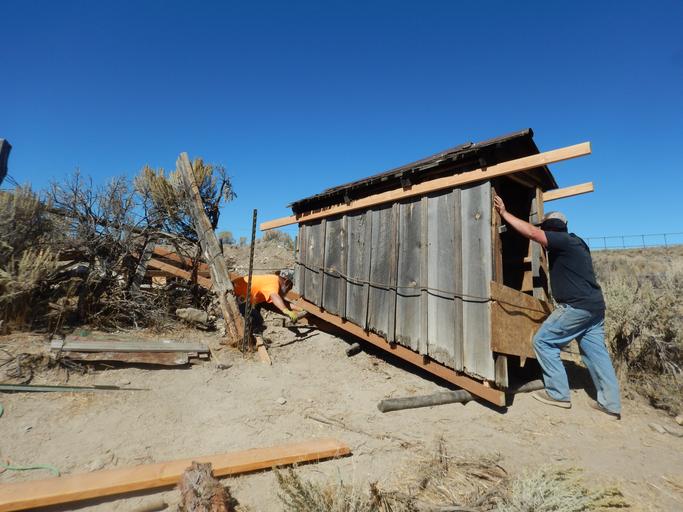MAKE A MEME
View Large Image

| View Original: | 2016_Bitner_Ranch_Root_Cellar_Project.jpg (4608x3456) | |||
| Download: | Original | Medium | Small | Thumb |
| Courtesy of: | www.flickr.com | More Like This | ||
| Keywords: history historic blmcalifornia california blmnevada nevada outdoors archaeology wildlife desert ranch preservation bureau of land management bureauoflandmanagement blmcareers outdoor careers outdoorcareers conservation past public lands publiclands heritage outdoor vehicle railroad -Story and photo by Jen Rovanpera, Archaeologist for the BLM Applegate Field Office The BLM Applegate Field Office just completed stabilizing and preserving a 1930s root cellar on the historic Bitner Ranch located in Washoe County, Nevada. The root cellar was built in the 1930s to store food and other perishables. It consists of a large cavity (cellar) built into the side of a hill just east of the ranch house. Juniper poles were laid across the top of the cavity, the covered with hay from the nearby meadow. Dirt was then piled onto the roof into order to insulate it further. A small wooden structure with steps leads down into the cellar. Once inside, the maximum height of the cellar is about 6 feet. Shelving units were built along three of the walls. Little is known about the beginnings of Bitner Ranch. A structure in Badger Meadows appears on a survey map as early as 1873/1874; however the land was not patented from the state of Nevada until 1900. Based on the style of barbed wire, some of the older corrals and fences were probably built sometime between 1874 and 1892. The ranch hosts a ranch house, a black smith shop with a bunk house for workers, a milk barn, a root cellar, an outhouse, corrals, and a small animal pen. Most of the remaining structures on the property were built in the 1920s, except for the root cellar which was built in the 1930s and the milk barn which might be one of the oldest standing structures on the ranch. The Bureau of Land Management acquired the Bitner Ranch in 1995. Bitner Ranch is an excellent example of a high desert, homestead era ranch and one of the few remaining ranches to be managed by the Bureau of Land Management in northwestern Nevada. The goal is to preserve the historic ranch, continue research, and establish an interpretive center about the history and wildlife of the meadow. The preservation project included removing the dirt that had caved into the cellar through the collapsed roof, stabilizing the wooden structure, and rebuilding the steps into the cellar. The project was completed in two weeks by Jed Mauldin, Dane Mauldin, and Kody Smith of S.T. Rhoades Construction, Inc. Pictured here, once entry way was re-built, the wooden structure was moved back into its original position. -Story and photo by Jen Rovanpera, Archaeologist for the BLM Applegate Field Office The BLM Applegate Field Office just completed stabilizing and preserving a 1930s root cellar on the historic Bitner Ranch located in Washoe County, Nevada. The root cellar was built in the 1930s to store food and other perishables. It consists of a large cavity (cellar) built into the side of a hill just east of the ranch house. Juniper poles were laid across the top of the cavity, the covered with hay from the nearby meadow. Dirt was then piled onto the roof into order to insulate it further. A small wooden structure with steps leads down into the cellar. Once inside, the maximum height of the cellar is about 6 feet. Shelving units were built along three of the walls. Little is known about the beginnings of Bitner Ranch. A structure in Badger Meadows appears on a survey map as early as 1873/1874; however the land was not patented from the state of Nevada until 1900. Based on the style of barbed wire, some of the older corrals and fences were probably built sometime between 1874 and 1892. The ranch hosts a ranch house, a black smith shop with a bunk house for workers, a milk barn, a root cellar, an outhouse, corrals, and a small animal pen. Most of the remaining structures on the property were built in the 1920s, except for the root cellar which was built in the 1930s and the milk barn which might be one of the oldest standing structures on the ranch. The Bureau of Land Management acquired the Bitner Ranch in 1995. Bitner Ranch is an excellent example of a high desert, homestead era ranch and one of the few remaining ranches to be managed by the Bureau of Land Management in northwestern Nevada. The goal is to preserve the historic ranch, continue research, and establish an interpretive center about the history and wildlife of the meadow. The preservation project included removing the dirt that had caved into the cellar through the collapsed roof, stabilizing the wooden structure, and rebuilding the steps into the cellar. The project was completed in two weeks by Jed Mauldin, Dane Mauldin, and Kody Smith of S.T. Rhoades Construction, Inc. Pictured here, once entry way was re-built, the wooden structure was moved back into its original position. | ||||